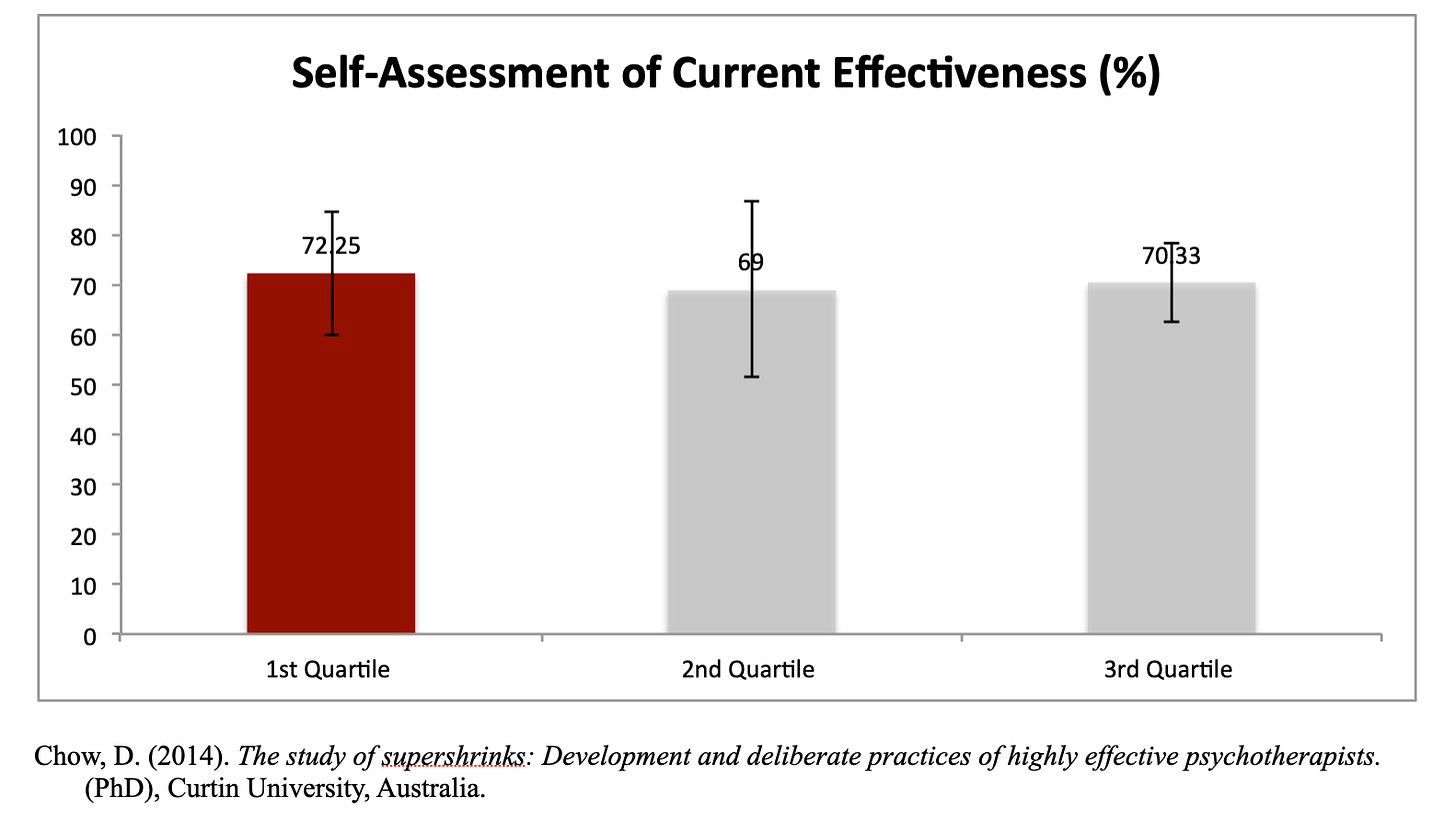Note: This article was originally published in Substack on 04 Oct. 2024
1. Research: The Lack Wobegon in China
Hot off the oven. (Hat tip to Lin Xuibin, Rodney Goodyear, Scott Miller, and Yang Ai for the collaboration).
Who says that us Chinese therapists are immune self-assessment bias?
Key Graf:
– Despite cultural norms that value modesty, exhibit a self-assessment bias, Chinese psychotherapists rated themselves as more effective than their peers.
– The average self-rated effectiveness of the Chinese psychotherapists in the study was the 71.4th percentile, with 96% of respondents placing themselves at or above the 50th percentile.
– No significant relationship between years of clinical experience and self-rated effectiveness
– Our tendency to overestimate our effectiveness can hinder professional growth and limit the overall improvement of psychotherapy as a field.
How does self-assessment relate with actual client outcomes?
Here’s what we found with therapists in the UK. We grouped them according to their aggregated client outcomes (5 years worth of clinical data), and compare with how they rated their own effectiveness:

Notice how similar the self-assessment ratings between the highly effective therapists and average therapists are?
2. Web-Read: Ignore Your Kids More Often
3. Web-Read: Are We Living in a Parasite Culture?
Ted Gioia books are amazing, and his Substack essays are brilliant. This is the writer I pay to read each of his Substack post.
Gioia says,
Nowadays, parasite businesses are the largest corporations in the world. Their technologies do many harmful things, but lately they have focused on serving up fake culture, leeching off the creativity of real human artists.
Just take a look at the dominant digital platforms—and consider how little they actually create. But the amount of leeching they do is really quite stunning, especially when compared with the dominant businesses of the past.
- What does Facebook really create? Almost nothing. It relies on 3 billion users to create content (ugh!—their word, not mine), and then monetizes these people and their unpaid labor.
- What does Google really create? Almost nothing. Just look at how it destroys newspapers, while doing zero journalism itself. The comparison with a parasite could hardly be more apt. It feeds off the news, but never adds to it.Then look at every one of Alphabet’s other business units, and ask the same question. What’s getting created here by the company itself? Very little—but this enormous business is a genuine innovator in parasitical software and business models, leeching off others so successfully, that it now has a market capitalization of $2 trillion.
- What does Spotify really create? Almost nothing. One person—a single individual—recently redesigned the Spotify user interface from scratch, and came up with something better. But the folks at Spotify don’t worry about their lousy app, because they’re so busy sucking blood from the creative economy, to which they contribute not one whit. Meanwhile, their CEO is now richer than any musician in the history of the world.
- What does TikTok really create? Almost nothing. This company relies on one million creators—none of them are employees. Most of them are working for hopes and dreams. TikTok is run like a Hollywood studio, but without cast, crew, directors, scriptwriters, or any creative talent whatsoever. But that hardly matters when you’re just a parasite living off unwitting hosts.
4. Recommendations: My Top 10 Books by Category
Thanks to the assistance from Adrian, we have now finally released a compilation of books that has shaped and influenced me.
Categories include Big Ideas, Business Creativity, Learning, Psychotherapy, Parenting, Spirituality, and more.
Let me know in the comments below if you have read any of the books mentioned in that list, or other books you would recommend that should be that list.
5. Words Worth Contemplating:
“The unexamined life is surely worth living, but is the unlived life worth examining?”
— Adam Philips, in Missing Out.
If you would like to learn more topics that can help your professional development, subscribe to the Frontiers of Psychotherapist Development (FPD). On Frontiers Friday (FPD), we serve you directly to your Inbox highly curated recommendations each week.





Recent Comments